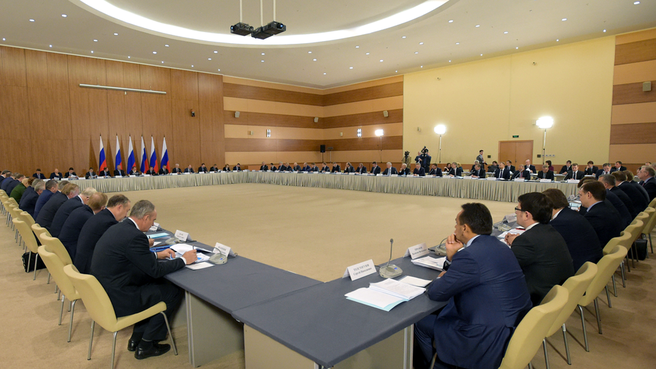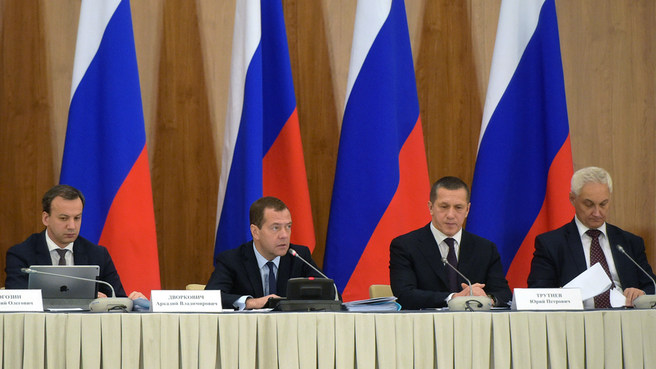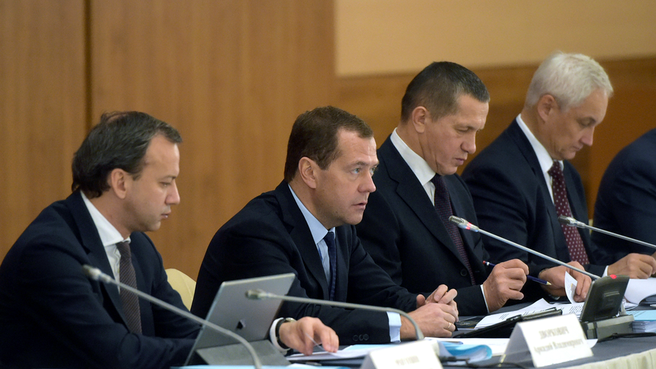Meeting participants discussed, among other things, import substitution during the implementation of investment projects for the development of the shipbuilding sector in the Far East.
Excerpts from Dmitry Medvedev’s opening remarks:
Today, we are holding a joint meeting of government commissions on import substitution and the socioeconomic development of the Far East and the Baikal region. We have deliberately combined their work, so that we can discuss import substitution by focusing on the Far Eastern shipbuilding industry.
We’ll have to develop numerous shelf deposits in the Arctic and the Far East. Therefore oil and gas companies need a lot of modern vessels and other marine technology. Shipbuilders are seeking a stable, guaranteed market for their products in order to feel more confident as they face tough competition from our nearest neighbours. In this case, the sector will have every chance to saturate a considerable segment of the domestic civilian shipbuilding market and to effectively assert itself on the global market.
We are proceeding from the assumption that long-term corporate development programmes provide for gradually replacing foreign equipment with Russian-made products.
We’re establishing an industrial shipbuilding and marine technology cluster at the Far Eastern Shipbuilding and Ship-Repair Centre in order to make the industry more popular with investors.
There are plans to lay the keel of the first vessel at the Zvezda Shipyard a year from now with the help of Rosneft, the main investor.
Our investors, Rosneft and the United Shipbuilding Corporation, have substantial requirements, but we should also involve other companies. The President and I have issued instructions to this effect.
I suggest that we decide by 1 February how the system of the Zvezda shipbuilding complex and the Far Eastern Shipbuilding and Ship-Repair Centre should operate. We need to establish a priority development area and to submit a document on its establishment in Bolshoi Kamen before 1 February.
The comprehensive development of Komsomolsk-on-Amur, including its industry, housing, education and healthcare, is another issue. We need to turn this city into a dynamically developing centre.
Several months ago, another priority development area was established there, focusing on aircraft construction and shipbuilding. We need to reassess the parameters of this priority development area, compare its business model with other plans to locate high-tech production facilities in the region, to upgrade enterprises and to make them operate at full capacity. The latter primarily concerns the Amur Shipyard and the Amur-Metal Iron & Steel Works, the only metallurgical company in the Russian Far East. And, finally, we need to link these measures and submit a comprehensive plan to the Government for consideration.
We need to closely analyse what we can finance under these sector-specific programmes, which could include the redistribution of funds from the federal and regional budgets and involve additional sources, the Far East Development Fund included.
We have just taken part in signing documents between KAMAZ and Rosneft for the purchase of over 1,200 KAMAZ lorries. This is a clear indication that major Russian companies are purchasing high-tech goods from other domestic companies.
I’ve also signed a number of resolutions for the development of Zvezda, including the transfer of some licensed federally owned deposits to Rosneft that will use Zvezda marine technology to develop them. This will promote the development of Rosneft and our major shipbuilding centre in the Far East that will implement additional contracts. For this purpose, we’ve also approved a ‘road map’ for the Eastern Petrochemical Company. The development of the Far East and the Baikal region will depend on the implementation of these resolutions, including import substitution issues.















